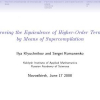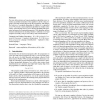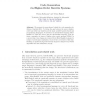26 search results - page 1 / 6 » Proving the Equivalence of Higher-Order Terms by Means of Su... |
ERSHOV
2009
Springer
13 years 11 months ago
2009
Springer
One of the applications of supercompilation is proving properties
of programs.We focus in this paper on a speci
c task: proving term
equivalence for a higher-order lazy functiona...
POPL
2009
ACM
14 years 5 months ago
2009
ACM
Previous deforestation and supercompilation algorithms may introduce accidental termination when applied to call-by-value programs. This hides looping bugs from the programmer, an...
POPL
2010
ACM
14 years 2 months ago
2010
ACM
The method of logical relations is a classic technique for proving the equivalence of higher-order programs that implement the same observable behavior but employ different intern...
CORR
2008
Springer
13 years 5 months ago
2008
Springer
In multi-input multi-output (MIMO) detection, semidefinite relaxation (SDR) has been shown to be an efficient high-performance approach. For BPSK and QPSK, it has been found that S...
FLOPS
2010
Springer
13 years 11 months ago
2010
Springer
Abstract. We present the meta-theory behind the code generation facilities of Isabelle/HOL. To bridge the gap between the source (higherorder logic with type classes) and the many ...



